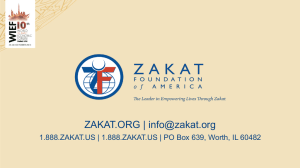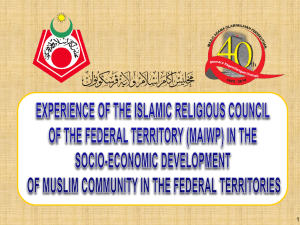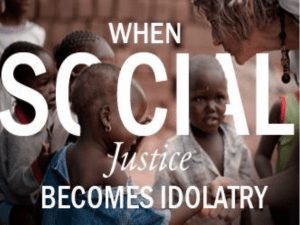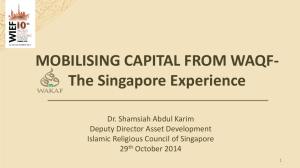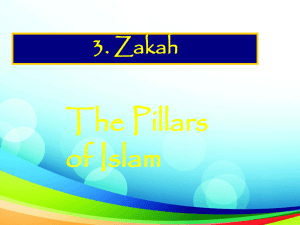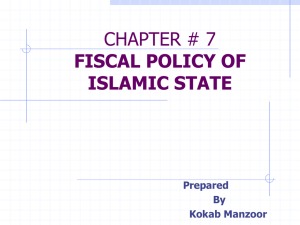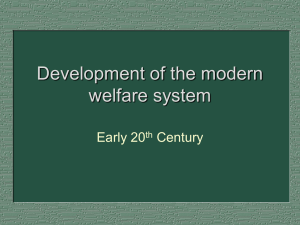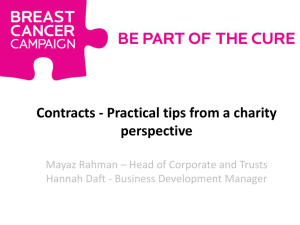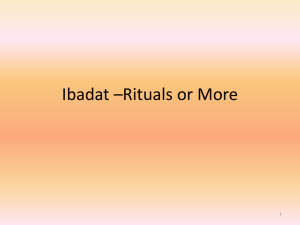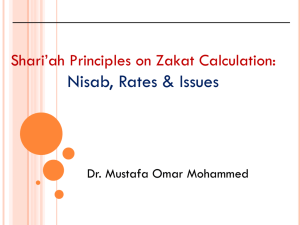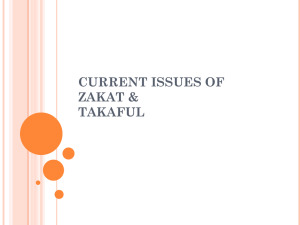Presentation by Dr. Maszlee Malik, Lecturer, International
advertisement
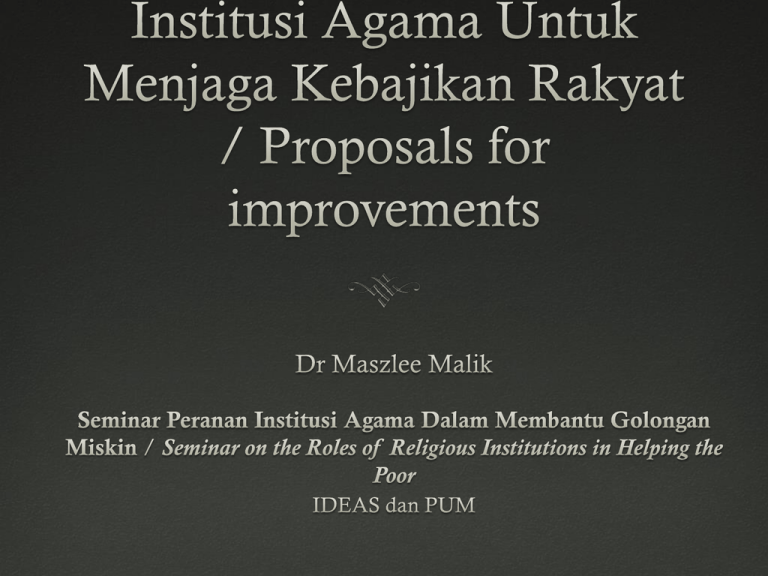
Background (Western Experience) 1) Religion – Public Sphere (Pre-Enlightenment) 2) Religion – Public Sphere (Post-Enlightenment) -Religion – Colonialisation (New role / Harmonization) -Religion & Civil Society (Welfare/ Charity) -Protestant ethos cultivates market economy (Max Weber). 3) Except for USA : The Active role of religion via Christian rights movements. Background (Asian Experience) 1) Persona Religiousus. 2) Religion as source of Welfare and Charity, and mainly separated from politics. 3) Temple, monastries and sanctuaries as shelter for poor people. 4) Sometime used as a tool to tame leaders, i.e. Asoka, Kautilya, Kausikan, etc. Background (Islam) Coined by Max Rodinson as ‘market-friendly’ religion (in refuting Max Weber). But, at the same time = Communal, societal-based and emphasize heavily on welfare via its value. It’s hard to explain or define the relation between state and religion, since there is no definitive arguments explaining such topic. Alas, it is a space for ijtihad (reasoning), which determined by the needs of community and zeitgeist. Major Principles relate to Welfare However, based on the universal inductive argument, there are few major principles imply the nature of economic justice and continuous effort for welfare as Shari’ah imperatives: 1) Tawhid (Unity of God (Allah); 2) Amanah (trust); 3) ‘adl wa ihsan (justice and fairness); 4) Islah (continuous effort for comprehensive excellence); 5) Ukhuwwah and Takaful (universal solidarity and mutual cooperation); 6) Maqasid al-Shari’ah (higher objectives of Shari’ah). Instruments Zakat (alms / charity). Waqf (endowment). Sadaqah (charity). Infaq (contribution). Ibadat jama’iyyah (collective for of ‘ibadat), i.e. Zakat Fitr (charity during ‘eid; Qurban (sacrifice); Hajj (pilgrimage); Daily Congregation prayers; Ramadan. BUT, unfortunately these instruments are being implemented with the absence of their spirit / maqasid (underlying philosophy). Historical facts During the early years of Islam, religion was part of the state, but there was no perfect bureaucratic system as known nowadays. Hence, Shura as a space for the public to have their share in administrating religion was a continuity of the primitive Arab decision-making process. It is hard to say whether religion is solely under state administration as known and understood nowadays, or it belongs to the people. However, during the Umayyad, due to the influence of Persio-Roman administration, state started to break the nature of public-state relation in concerning religion practiced. Thanks to Umar Abdul Aziz who rendered religion back to public. Historical facts During Abassid period, due to the level of corruptions practiced by the state, Ulama (scholars) managed to salvage the religion by creating the ‘Awqaf ’ (religious matters) sphere controlled by the people via religious institutions separated from the state. Ulama stand as the voice of the society/people against the state. Waqf flourished in sustaining the welfare of the people and in fertilizing education institutions (i.e al-Azhar, al-Zaytounah, Nizamiyyah, etc.) Clear role of Waqf, zakat and infaq in culminating the wellbeing of the society could be seen during in Andalusia and Ottoman period. (masjid-bazaar-caravansery-darussifafountains-gardens). Historical facts However, during the colonialisation period, new reality being imposed on Muslim society. Religion is controlled solely by the state under the supervision of the Colonials, due to the role of religion in resistance and struggle against the invaders/colonials. Waqf being adulterated. Zakat being monopolised by the state. Religion secluded into private sphere. However, society found religion as a resort to mutually preserving the welfare and the well-being of its members. Reality in Malaysia Post-Colonial period – Religion belongs to the state (under the custodian of the Sultans). Majlis Agama and Jabatan agama as the main religious authority in the state. Religion (Islam) is put under the bureaucrats, and operating as one of the state instruments. Manipulated by politicians in many occasions. People only have limited role in shaping the future of religion, and religious administration. Proposals 1) Privatization (devolution) of zakat: - Via the empowerment of society. - Instead of monopolizing the zakat collection and distribution, religious authority could render some of its privilege to the society. - By giving tauliah to NGOs, Masjids, Community associations, schools, learning institutions to have the same function as ‘Pusat Kutipan Zakat’. Waqf Reform Expanding the role of zakat (endowment), and empower non-state actors to run awqaf. Higher learning institutions, schools, clinics, hospitals to be given authority to accept waqf. Business entities to run waqf funds such as practised in Turkey and some Balkan countries. Current expereince: Hizbullah in southern Lebanon, Muslim Brotherhood in (rural places) Egypt. Activation of IHSANI Social Capital 3rd sector actors. Putnam (1993, p. 167) defines social capital as: “features of social organization, such as trust, norms, and networks, that can improve the efficiency of society by facilitating coordinated actions.” IHSANI social Capital Social capital refers to social networks and the norms of reciprocity and trustworthiness that arise from connections among individuals as the same way as the physical capital (accumulated by physical objects and human capital) to the properties of individuals. In such sense, Social capital can be depicted closely to what some have called “civic virtue” (Putnam, 2000: 19). Social capital works tremendously in enhancing the role of civil society, participation, eradicating poverty and corruptions, education and accountability (James Colemen, 1990; Kenneth Newton, 1997). IHSANI Social Capital The principal of ihsaan drives (functioning) individuals to keep striving towards comprehensive excellent in attaining falaah in his life in line with Maqasid al-Shari’ah. The accumulation of ihsaani individuals will be resulting to the establishment of benevolent society and effective institutions, which enable the establishment of effective minimal state. Means to achieve the society ‘well being’ in the other facet directly contributing towards the development of ‘social capital’ (which is currently agreed by many as an effective elements to promote economic development via 3rd sector industries, equality, participation, and democracy). IHSANI Social Capital Crystallised via Islamic NGOs (Jamaah), charity organisations, mosques, family associations, interest groups. i.e Evangelist churches in USA, Savordaya Sharmadana, Buddhist Tzu Chi, Darul Arqam, etc. Tsunami 2004 experience shows how faith-based/ faithoriented non-state actors (NGOs) could contribute towards development. Masjids reforms To be more than place of worship. Community centre. Comprehensive reforms to bring back the original function of masjid works for charity and welfare (i.e. Ahl Suffah, distribution of spoils, etc.) Business Guild (Ahilik Kulturi) Association of Muslim merchants and traders. Ahilik Kulturi in Anatolia Ottoman Turkey. Works for SME and micro-financing. However requires a unique corporate governance model to maintain its effectiveness. Faiths network Working on similar grounds an avoiding high plane issues. i.e fighting against poverty, crimes, drugs, corruptions, etc. Networking of masjids, churches, temples in housing area to for education, health, well-being, economic co-operation, charity, environment, etc. (could avoid the controversial proselytizing issue) i.e. Citizen initiative UK. Thank You
